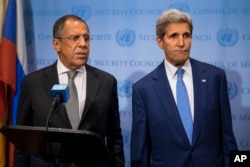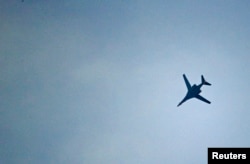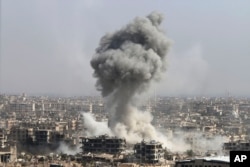The White House criticized Russia on Wednesday for its "red-carpet welcome" of Syrian President Bashar al-Assad in Moscow.
Spokesman Eric Schultz said such treatment was at odds with Russia's stated goal of helping to arrange a political transition in Syria.
“We view the red-carpet welcome for Assad, who has used chemical weapons against his own people, at odds with the stated goal by the Russians for a political transition in Syria,” Schultz said.
U.S. officials said they were not surprised by the Assad visit to Moscow, even though the Kremlin kept it a secret.
Assad returned home Wednesday from what was believed to have been his first overseas trip since 2011, when peaceful protests against his government began to grow into today's civil war. The fighting so far has killed at least 240,000 people. Many of the victims have been civilians.
Assad held talks at the Kremlin with Russian President Vladimir Putin. He thanked Putin for Russia's intervention, saying it had stopped the spread of more "terrorism" in Syria. "Terrorists" is the word Assad uses to refer to the rebels.
Russia entered the war in Syria three weeks ago with the stated intent of destroying Islamic State. But the U.S. has said Russian airstrikes have instead hit other rebel groups and are actually meant to prop up Assad.
Republican Senator Susan Collins of Maine told VOA on Wednesday that Syria was a Russian "client state" and that Assad believed he could not survive without Putin's support.
Another Republican, Colorado's Corey Gardner, said Putin was now also directly responsible for any murderous attacks Assad unleashes on Syrian civilians.
Kerry, Lavrov meet Friday
Meanwhile, Russia's Foreign Ministry announced that Foreign Minister Sergei Lavrov would meet Friday with U.S. Secretary of State John Kerry in Vienna to discuss the situation in Syria. They will be joined by the foreign ministers of Saudi Arabia and Turkey.
The ministry said Kerry and Lavrov spoke in a telephone conversation initiated by the U.S. side, during which they discussed preparations for the Vienna meeting.
The Kremlin said in a statement later Wednesday that Putin had made telephone calls to Turkey's President Recep Tayyip Erdogan, Saudi Arabia's King Salman, Egyptian President Abdel Fattah el-Sisi and Jordan's King Abdullah II.
It said the calls were mainly devoted to the situation in Syria and "the joint fight against international terrorism," adding that the Russian president had briefed the four leaders on the results of his talks with Assad.
Memo of understanding
On Tuesday, Russia and the United States signed a memorandum of understanding providing a framework for both countries' aircraft to maintain a "safe distance" from one another while operating over Syria.
Pentagon spokesman Peter Cook declined to say what that distance was, but he said U.S. crews were aware of it. “It is safe to say that anything that could be deemed as threatening or hostile would be deemed a violation of this agreement,” he said.
Cook said the Russians requested that the full agreement not be shared publicly. But he said it contained protocols that include “maintaining professional airmanship at all times, the use of specific communications frequencies, and the establishment of a communication line on the ground.” He said the ground communication would serve as a backup in case midair protections failed.
The agreement covers all types of aircraft over Syria, including drones, and it is specific to Syria. It does not apply to any other country.
"The Russians now need to abide by these flight safety protocols" in Syria, Cook said. "We don't want miscalculation."
Pentagon officials have stressed the air guidelines are not part of a broader agreement on how the two countries could operate in Syria, nor do they indicate the United States in any way supports what Russia is doing there.
“We continue to believe that Russia’s strategy in Syria is counterproductive and the Assad regime will only make Syrian civil war worse,” Cook said.
Russian airstrikes
The Syrian Observatory for Human Rights said Tuesday that Russian airstrikes killed at least 45 people Monday in Latakia province.
Cook asserted that the United States would continue with its own strategy in Syria, attacking the Islamic State group and supporting Syrian moderates. The U.S.-led coalition has targeted Islamic State militants in Syria with more than 2,600 airstrikes since September 2014.
The Russians asked the United States for talks on “deconfliction” after beginning airstrikes last month.
The Pentagon has reported no major incidents in Syrian skies since Russia started airstrikes there, although there have been a couple of instances when coalition aircraft have had to change course to avoid getting too close to Russian jets.
















